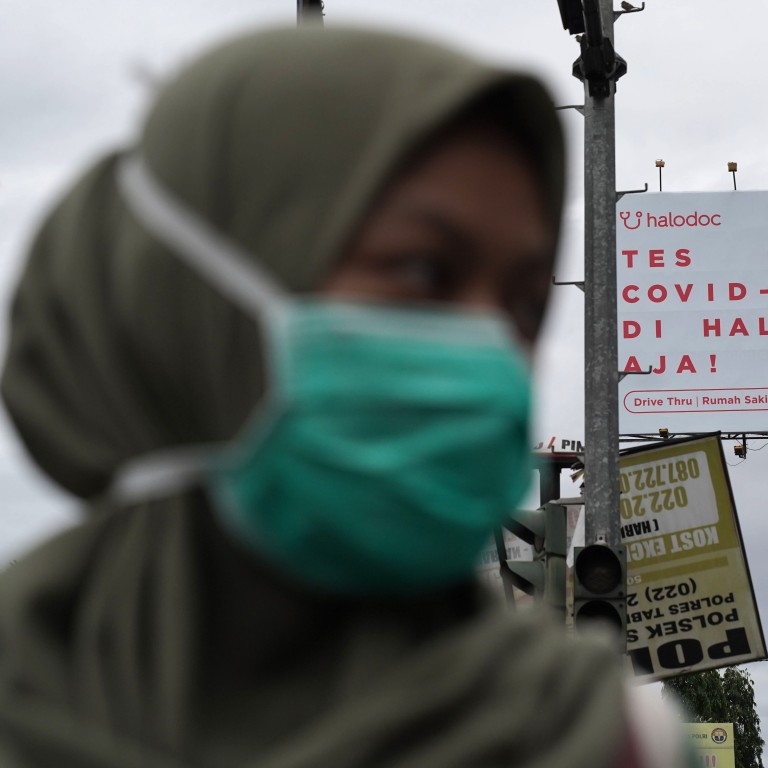
Coronavirus: China’s firms ‘set to export 400 million vaccine doses’
- But questions remain about the shots, the trial data and how vaccinating the Chinese population at home fits with Beijing’s overseas aims
- It is a chance for the country to boost its reputation for pharmaceuticals, says observer
Three front-running Chinese firms – China National Pharmaceutical Group (Sinopharm), Sinovac Biotech and CanSino Biologics – have made those deals to supply countries in Latin America, the Middle East and Asia, according to public data compiled by both British analytics firm Airfinity and the Duke Global Health Innovation Centre in the United States.
Experts say political will and industry capacity mean China could play a significant role in improving limited global supply of Covid-19 vaccines. But questions remain about vaccine efficacy and data transparency, as well as how Beijing will balance its overseas aims with vaccinating its domestic population of 1.4 billion.
In a briefing on the weekend, health officials said China had yet to approve any of its home-grown vaccine candidates for general use, but some candidates had collected enough data for interim analysis of their phase 3 trials and this was being submitted to regulators for review on a rolling basis.
Chinese vaccine developers file for approval ahead of mass inoculations
Brazil and Indonesia have both received shipments of Sinovac’s candidate in recent weeks. Both countries are running phase 3 trials and have yet to approve the vaccine, whose trial data is expected within days.
This month, Egypt accepted its first batch of a Covid-19 vaccine developed under state-owned Sinopharm and shipped from the United Arab Emirates, which ran a clinical trial and approved the vaccine on December 9.
Public vaccinations have already launched in the Emirati capital Abu Dhabi, according to local media reports. Health authorities cited 86 per cent efficacy in an interim phase 3 analysis, although data has yet to be released by the company. Another trial site, Bahrain, has also approved the vaccine.

Other countries with agreements for doses developed by Chinese firms include Mexico, Morocco, Chile, Indonesia, Singapore and Turkey. Indonesia leads in quantity, with 125.5 million doses from Sinovac, 60 million from Sinopharm and 20 million from CanSino. It is possible there are other deals that have not been made public.
Much is at stake for China in an overseas roll-out of its vaccines, according to health security researcher Nicholas Thomas, who points to China’s “difficult year” diplomatically as it contended with global scrutiny of its early handling of the outbreak, first identified in the city of Wuhan in central China.
“The successful deployment of their vaccines around the world will help to ameliorate some of those tensions,” said Thomas, an associate professor at City University of Hong Kong.
“Domestically, the vaccines help to support the narrative that the government is [making] a significant effort in alleviating the global disruption and distress caused by Covid-19.”
But navigating between overseas commitments and domestic needs will be a “balancing act” that Beijing needs to manage well, according to Xiaoqing Boynton, a vice-president at Washington consultancy Albright Stonebridge Group.
“China doesn’t currently have an active outbreak, so in terms of prioritisation you have a domestic agenda, however you are also dealing with very active hotspots globally, including localities that are of strategic importance to China,” said Boynton, who focuses on China’s health and life science sectors.
At a briefing on Saturday, National Health Commission official Zheng Zhongwei said China had made “relevant arrangements when planning vaccine production capacity” to support overseas vaccine access.
Vaccines for world’s vulnerable no guarantee of a ‘silver bullet’: WHO
The commission said in September that China could produce 610 million doses this year and a billion next year, but it remains unclear if a specific number of those are earmarked for export.
Officials did not provide those figures on the weekend. Zheng said efficacy data would be released to the public “in time” after the trials were unblinded.
This will be critical for understanding what role they might play in global Covid-19 vaccine supply, according to John Donnelly, a principal at Vaccinology Consulting in the US.
“That data is really important. Until people have had a chance to review it, nobody can really make any conclusions one way or another,” he said.
“If [those vaccines] turn out to work well and be relatively straightforward to manufacture, then there is a pretty significant potential for local manufacturers … to pick up the ability to produce them for their own region or country,” Donnelly said, noting this technology transfer could be a key way for China to contribute to global vaccine supply.
“This is a unique opportunity for Chinese industry to demonstrate its qualifications, in terms of safety and quality standards, and become a reliable supplier of vaccines on a global scale,” Boynton said.
Additional reporting by Reuters

